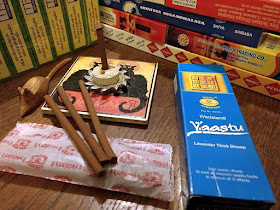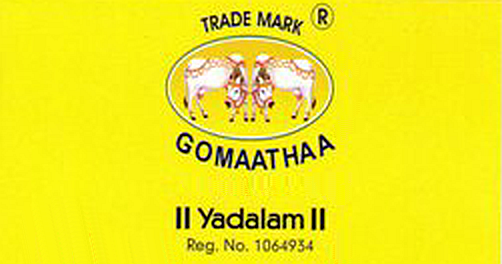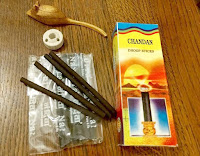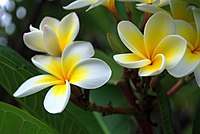Sree Yadalam Dhoops Industries of Bangalore (or Bengaluru) were founded in 1999, and use the Gomaathaa trademark. Gomaatha is the Indian name for the cow as the holy mother, and a cow is used in their trademark. The company went bankrupt in 2012, with the Central Bank of India selling off some of the companies assets. However, as of 2018, they appear to still be trading. Their products have been sold in a variety of online shops in the UK in the past, so may have been imported before 2013 by Aagee or another wholesaler. As of Nov 2018, the only available stocks appear to be on the Just Aromatherapy site who have a few left for £1.05 a pack. At one time a Sree Sai Dha Sangam Dhoop Stick by Yadalam was available in America, but not currently, and I don't think they have ever been available in other countries outside India. While everything I have sampled of theirs has been dhoops, there are trade listings which indicate they also sell joss sticks or agarbatti.
I was told in 2018 that the company had closed.
The word "Shree", which I have seen on other Indian incense, sometimes written as Shri or Sri, is a polite form of address for people, divine or secular, and in this case refers to the owner, Mr. (or Sree) Yadalam Chakrapani.
The Vaastu range of dhoops sticks are pleasant everyday dhoops. There's nothing especially profound or remarkable about the collection, but they are pretty decent dhoops using all natural ingredients, and are well worth trying at the price. The wording on the box is: "Use vaastu dhoop to cure all inherent vaastu faults to remove all ill effects". Curious I looked up vaastu, and found that it is normally written vastu or vaastu shastra, and is an ancient Vedic science of place or direction, similar to feng shui, and was used to guide the architecture of buildings. If there are disturbances in one's life, this may be caused by disharmony within a building - a vastu dosh. Using Vedic principles, harmony can be restored through use of the appropriate elements, which includes the ritual burning of certain incenses such as gugal. While the range is marketed as being functional rather than aesthetic, the quality and naturalness of the ingredients means that they are actually very pleasant. They don't quite reach heavenly, but they are very decent everyday incenses, and it's a shame they had such limited availability, and the company is now closed.
Reviews
[*Reviews are over 5 years old, so scores may not be reliable]
 |
| Yadalam Vaastu Champa Thick Dhoop Nov 2018 - Score: 37* |
 |
| Yadalam Vaastu Rose Thick Dhoop Oct 2018 - Score: 37* |
 |
| Yadalam Vaastu Loban Thick Dhoop Oct 2018 - Score: 32* |
 |
| Yadalam Gomaathaa Dhoop Bathi Oct 2018 -Score: 32* |
 |
| Yadalam Vaastu Sandal Thick Dhoop Nov 2018 - Score: 31* |
 |
| Yadalam Vaastu Camphor Thick Dhoop Nov 2018 - Score: 26* |
 |
| Yadalam Vaastu Lavender Thick Dhoop Feb 2023 - Score: 25 |
 |
| Yadalam Vaastu Gugal Thick Dhoop Nov 2018 - Score: 20* |
Scents tried: 8
Highest Score: 37
Lowest Score: 20
Overall Score: 30 (Borderline decent everyday dhoop)
***
 |
| Vintage Incense (Incense not available from this brand for over a year) |



















